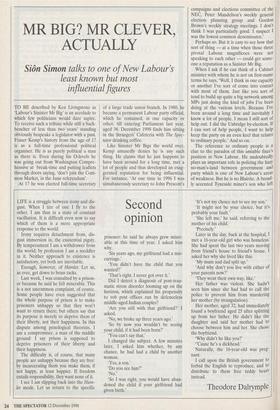Second opinion
LIFE is a struggle between irony and dis- gust. When I tire of one I fly to the other. I am thus in a state of constant vacillation. It is difficult even now to say which of them is a more appropriate response to the world.
Irony requires detachment from, dis- gust immersion in, the existential pigsty. By temperament I am a withdrawer from the world; by profession I am a meddler in it. Neither approach to existence is satisfactory, yet both are inevitable.
Enough, however, of Hamlet. Let us, as ever, get down to brass tacks.
Last week, I was consulted by a prison- er because he said he felt miserable. This is a not uncommon complaint, of course. Some people have even suggested that the whole purpose of prison is to make prisoners unhappy so that they won't want to return there; but others say that its purpose is merely to deprive them of their liberty, not their happiness. In this dispute among penological theorists, I am a compromiser, a man of the middle ground: I say prison is supposed to deprive prisoners of their liberty and their happiness.
The difficulty is, of course, that many people are unhappy because they are free: by incarcerating them you make them, if not happy, at least happier. If freedom entails responsibility, they want none of it.
I see I am slipping back into the Ham- let mode. Let us return to the specific prisoner: he said he always grew miser- able at this time of year. I asked him why.
`Six years ago, my girlfriend had a mis- carriage.'
`You didn't have the child that you wanted?'
`That's right. I never got over it.'
Did I detect a diagnosis of post-trau- matic stress disorder looming up on the horizon, which explained his propensity to rob post offices run by defenceless middle-aged Indian couples?
`Are you still with that girlfriend?' I asked.
`No, we broke up three years ago.'
`So by now you wouldn't be seeing your child, if it had been born?'
`You can't say that.'
I changed the subject. A few minutes later, I asked him whether, by any chance, he had had a child by another woman.
`Yes, a son.'
`Do you see him?'
`No.'
'So I was right, you would have aban- doned the child if your girlfriend had given birth.' `It's not my choice not to see my son.' `It might not be your choice, but it's probably your fault.'
`She left me,' he said, referring to the mother of his child.
`Precisely.'
Later in the day, back at the hospital, I met a 16-year-old girl who was homeless. She had spent the last two years moving from friend's house to friend's house. I asked her why she lived like this.
`My mum and dad split up.' `And why don't you live with either of your parents now?'
`They went their own way, like.'
Her father was violent. She hadn't seen him since she had had to call the police to prevent him from murdering her mother (by strangulation).
Her mother, aged 32, had immediately found a boyfriend aged 25 after splitting up from her father. He didn't like the daughter and said her mother had to choose between him and her. She chose the boyfriend.
`Why didn't he like you?'
"Cause he's a dickhead.'
Naturally, the 16-year-old was preg- nant.
I call upon the British government to forbid the English to reproduce, and to distribute to them free teddy bears instead.
Theodore Dalrymple










































































 Previous page
Previous page